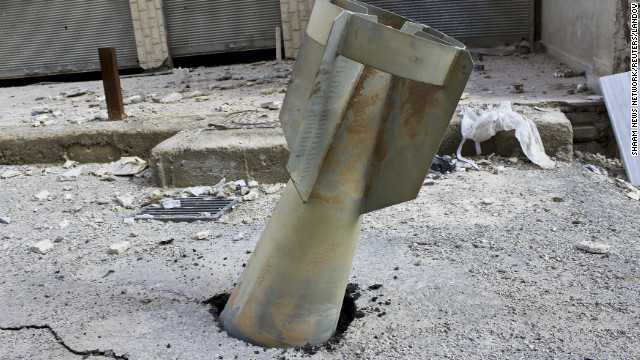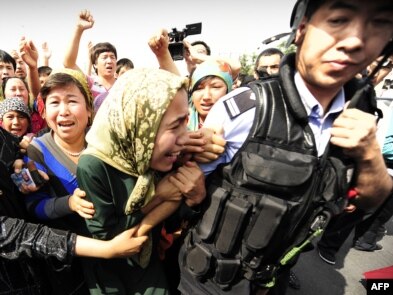2010-08-10
Chinese authorities hold an elderly Uyghur farmer in Beijing.
Abdurehim Mollek says his land in Onsu county was sold to a resettled Han Chinese farmer by local officials.
HONG KONG-Authorities in Beijing are holding an 84-year-old Uyghur farmer after he traveled to the capital to lodge an official protest over the loss of his farmland, the man and his son said.
Abdurehim Mollek, a Muslim Uyghur from Aksu prefecture in the troubled northwestern region of Xinjiang, was being held by police after being taken from his motel room in the eastern Beijing suburb of Weigongcun, he said.
Traveling with his 29-year-old son, Abdurehim Mollek said Sunday he had already been detained without trial for two years by authorities in Aksu’s Onsu (in Chinese, Wensu) county after he tried to petition over the actions of local officials.
“We are in the Xinjiang Affairs Department’s motel with dozens of other Uyghur petitioners. I am allowed go out to the yard of the motel, but my father is not. There are two guards at the motel door who are always watching us. Probably in the next few days the police will come from Aksu to return us there,” his son said.
“The Xinjiang Affairs Department usually holds us until the local officials come to take us away. That’s how it has worked most of the previous 10 times,” he said, referring to earlier trips his father had made to Beijing to petition.
Abdurehim Mollek’s son said they had been planning to petition publicly at Tiananmen Square or at an international news bureau to make their voices heard.
An officer who answered the phone at the Wanshousi police station in Beijing confirmed Abdurehim Mollek’s detention.
“Yes, yes, that’s right … He is a petitioner. It says so in the system,” the officer said. “The system has identified him as a key petitioner.”
Taken from motel
He described their detention Monday by regular police officers at their motel in the capital.
“Three Beijing policemen came to our motel room in the morning [at 9 a.m.] and checked our documents,” Abdurehim Mollek’s son said.
“Abdurehim Mollek showed the police our IDs and papers about our case. Then the police took us to their office.”
“They asked no questions and conducted no investigation. We were not allowed to have any food to eat. We were finally released at 6 p.m.,” he said.
The father and son were placed in the custody of two police officers, a Uyghur and Han Chinese, who brought them to the Xinjiang Affairs Department and placed them, under guard, in a motel room at the department’s headquarters.
“Regardless of whether the authorities agree to solve our problem, we will stay here. If we go back [to our hometown], we might be detained or sentenced. The last time [my father] was brought back home, he was detained in a mental hospital for 60 days. [The police said] if we petition again, we will be detained in a mental hospital permanently,” his son said.
Years of petitioning
Abdurehim Mollek has been petitioning ever since local officials in Kizil [in Chinese, Qingnian] village took over 220 mu (36 acres) of his farmland in 1997.
His property was part of a total 3,000 mu (494 acres) of land which belonged to 20 Uyghur farmers, taken by local officials and sold to a Chinese farmer surnamed Chen who had recently settled in the village from another province.
The land was later resold to another Chinese farmer surnamed Lu, who is the current owner.
Abdurehim Mollek said the two Chinese farmers are close relatives of village chief Han Guoming, although calls to the village office to confirm this went unanswered.
After being provided only a portion of his promised compensation, Abdurehim Mollek petitioned local and provincial authorities for 10 years.
In 2007, he began to petition the central government and has since traveled to Beijing 11 times to plead his case.
In 2008, he was held without trial in a detention center in Onsu county for two years. His most recent visit to Beijing was his second trip in three months, and the second since his release.
After his previous trip to the capital, Abdurehim Mollek was forcibly repatriated to Aksu prefecture and held in a local mental hospital for 60 days.
He has been returned to Xinjiang under police guard nearly every time he has petitioned the central government.
Other petitioners targeted
Mamut Rozi, a Uyghur from Yarkent county, in Xinjiang’s western Kashgar prefecture, is also currently in Beijing petitioning the central government over the forced sale of his land by local officials to a resettled Chinese farmer.
In a telephone interview, Mamut Rozi said he feared being forcibly repatriated to Yarkent by local authorities.
Two of his Uyghur roommates in Beijing were arrested by Xinjiang provincial police and taken to Aksu prefecture.
The roommates, former workers at an Aksu sugar factory, had been chosen as representatives by a group of 200 workers recently fired by the plant to petition authorities in the capital over the loss of their jobs.
“[The police] said to my roommates, ‘Why are you organizing others to petition? Why don’t you just take care of your own case? We’re arresting you for illegal organizing,’” Mamut Rozi said.
“I couldn’t hold back my tears as I saw them handcuffed by the police.”
‘Cause for concern’
Dilxat Raxit, spokesman for the Munich-based World Uyghur Congress, said petitioners like Abdurehim Mollek are highly vulnerable to arbitrary detentions by Beijing authorities if they try to complain about their local government in the capital.
“And after they get sent back [to Xinjiang] they become a real cause for concern,” Raxit said.
“Every time a Uyghur is sent back to Xinjiang, they are either sentenced to labor camp, or they suffer some kind of economic punishment.”
Dilxat Raxit said this is routine. “All Uyghurs in this situation who get sent back home end up suffering for it to a greater or lesser degree.”
“Many petitioners who travel to Beijing to complain from all over China are picked up by officials from their hometowns, who run representative offices in the capital for this purpose, and are escorted back home, where they can face beatings, surveillance, and further detention.
China’s army of petitioners say they are repeatedly stonewalled, detained in “black jails,” beaten, and harassed by authorities if they try to take a complaint against local government actions to a higher level of government.
Millions of Uyghurs—a distinct, Turkic minority who are predominantly Muslim—populate Central Asia and Xinjiang.
Uyghurs say they have long suffered ethnic discrimination, oppressive religious controls, and continued poverty and joblessness despite China’s ambitious plans to develop its vast northwestern frontier.
Those frustrations erupted in July 2009 in deadly riots that left nearly 200 people dead, by the Chinese government’s tally.
Chinese authorities blame Uyghur separatists for a series of deadly attacks in recent years and accuse one group in particular of maintaining links to the al-Qaeda terrorist network.
Original reporting in Uyghur by Shohret Hoshur and in Mandarin by Qiao Long. Translated by Luisetta Mudie and Shohret Hoshur. Written in English by Joshua Lipes and Luisetta Mudie.
https://www.rfa.org/english/news/uyghur/farmer-08092010142338.html





